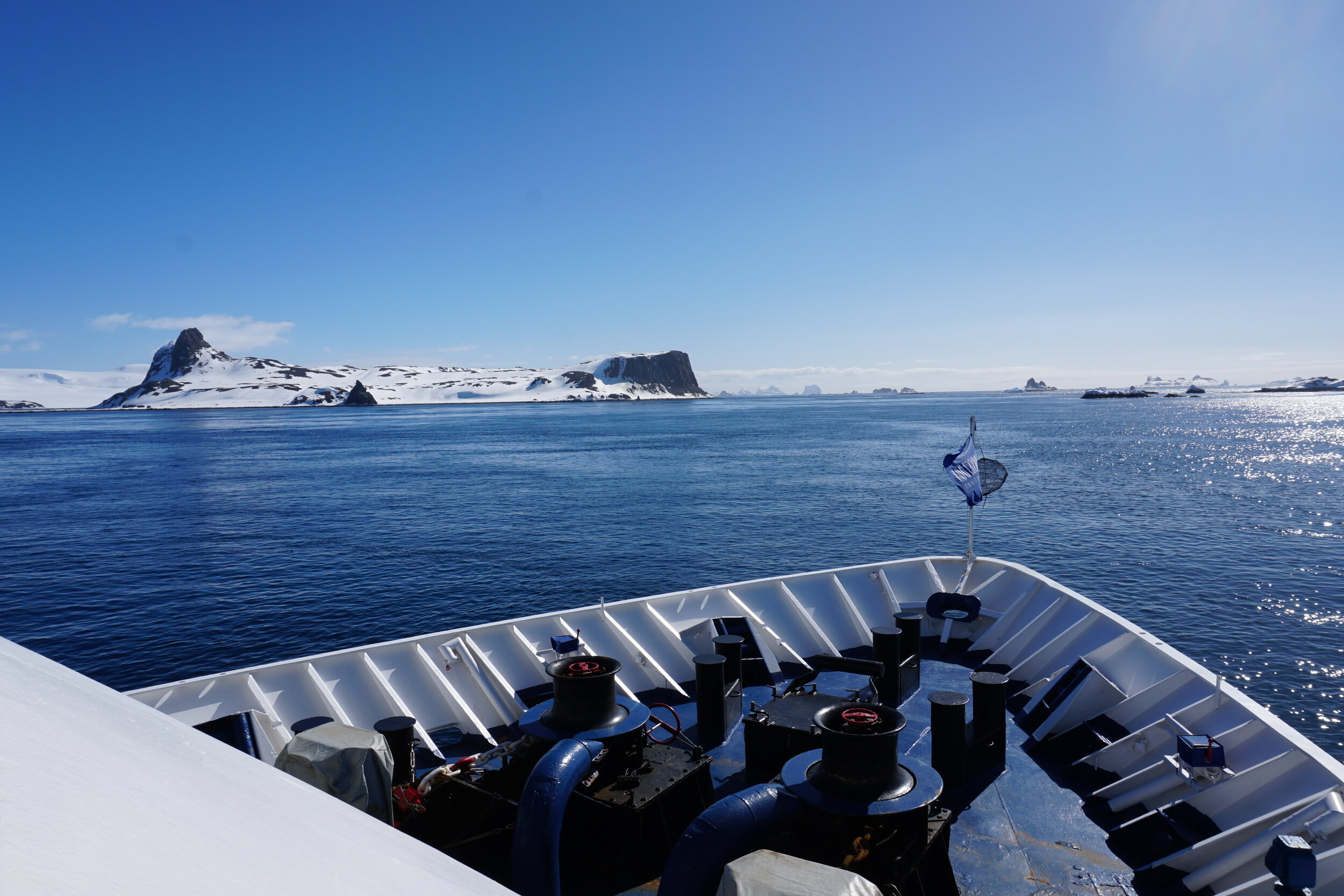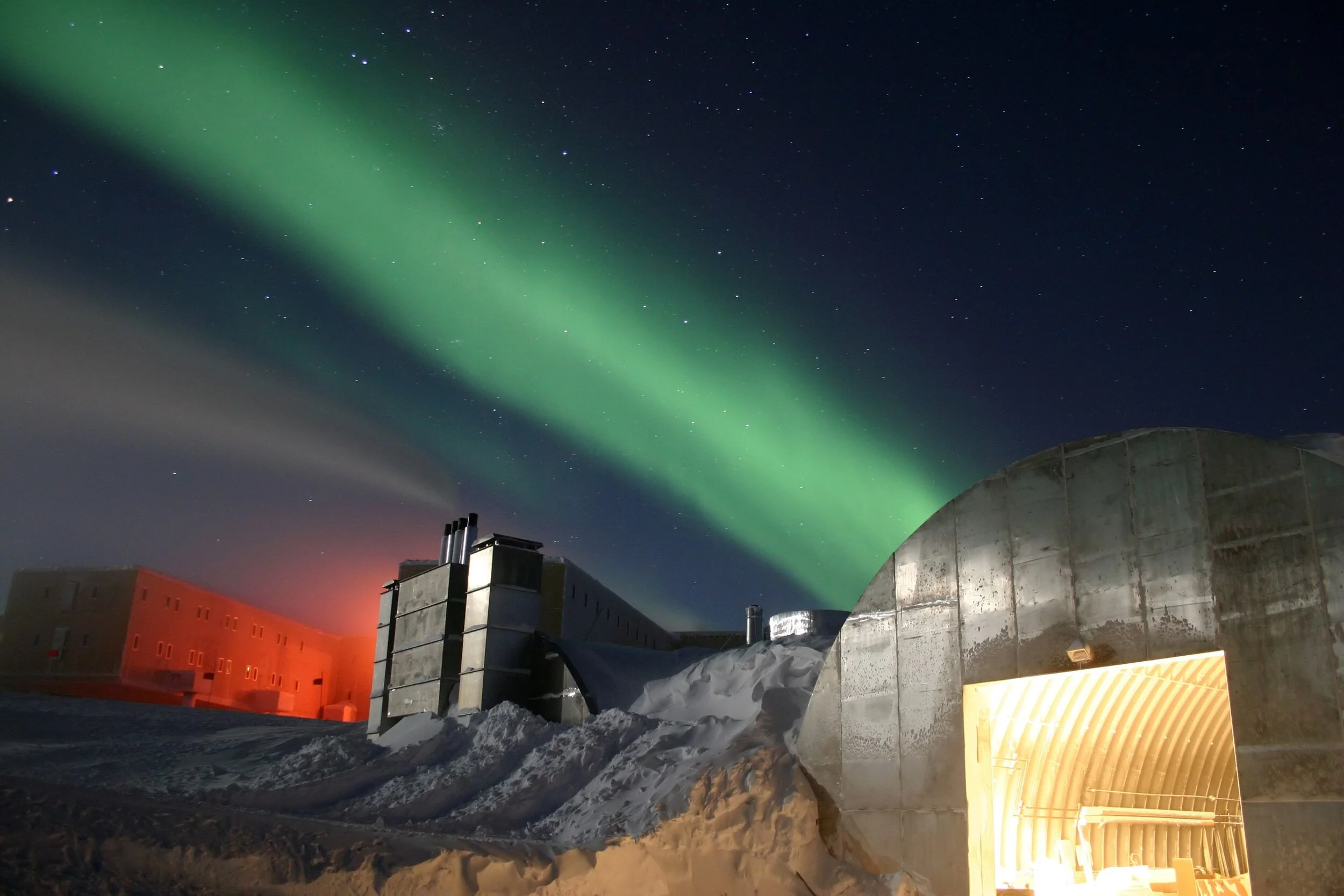ANTARCTICA
Release date: 12/05/19
Shebbie journeys to the most remote continent on the planet, Antarctica, where she makes some surprising new friends and discovers a new sense of calm.
Inside the Episode: Antarctica
“If Antarctica were music it would be Mozart. Art, and it would be Michelangelo. Literature, and it would be Shakespeare. And yet it is something even greater; the only place on earth that is still as it should be. May we never tame it.”
― Andrew Denton
Flag of the Antarctic Treaty
History:
Lying at the bottom of the world, it sits alone in frigid isolation. The coldest, driest, and windiest continent on the planet, Antarctica is the last region on Earth to be touched by man. A sprawling desolate polar desert stretching out over 5,000,000 square miles, Antarctica has captivated the human imagination since before even it’s documented discovery.
In Europe, legends of an undiscovered land mass at the Southern Pole date back as far as Ancient Greece, with the theories of Ptolemy and Aristotle. Later, the Romans would refer to this speculative continent as Terra Australis Incognita - “The Unknown Land of the South”- a name that would stick for almost 2,000 years. But as the Age of European Exploration progressed, the fabled Terra Australis Incognita remained undiscovered and belief in it’s existence began to wane. By the 1800’s it was dismissed outright, and it’s name was finally attributed to present-day Australia by explorer Matthew Flinders in 1814, believing it to be the most southern continent on the planet. Only two decades later, the world would learn just how mistaken Flinders had been.
Ernest Shackleton and his crew during the Nimrod Expedition
Historians dispute who first confirmed Antarctica’s existence, but by the 1840’s, the reality of a continent at the Southern Pole was beyond dispute. With it’s name having already been miss-attributed to Australia, the region was simply referred to as “The Antarctica”, in contrast to it’s northern counterpart, “The Arctic.” Explorers such as James Clark Ross, Roald Amundson, and Ernest Shackleton took on the challenge of exploring and mapping the treacherous ice shelves and vast, untouched expanses of Antarctica. The tenacity and daring of these early Antarctic expeditions captured the popular imagination and in many ways served as the final chapter of humankind’s saga of exploration. The last blank spots on the map were finally filled in.
Ecology:
The Amundson-Scott Research Center
Though mostly inhospitable to humans, life nonetheless persists on the Antarctic continent. Species of penguins, seals and whales all call the continent home and thrive in the otherwise hostile terrain. While there is no native human population, dozens of research stations now dot the continent, allowing for scientists from all over the world to study it’s unique ecosystems.
Climate Change:
Ozone Hole above Antarctica
Temperatures in the Antarctic
Like it’s northern counterpart, the Antarctic is not immune from the effects of global climate change. In 1985, the infamous “Hole in the Ozone Layer” was first detected in the atmosphere over the Southern Pole, with many linking it’s expansion to the global increase in carbon emissions. A 2013 study published in Nature Geoscience also suggested that it’s annual temperatures have been rising over the last half-century. Though Antarctica’s future isn’t in immediate jeopardy, it’s continued transformation speaks to the impact that human activity is having on every region of the planet, even those at the most remote fringes.
LIVE LIFE SERIES EPISODES
EPISODE 4: FRENCH POLYNESIA
11/07/19
EPISODE 5: AUSTRALIA
11/21/19
EPISODE 6: ANTARCTICA
12/05/19
EPISODE 7: LAS VEGAS
12/19/19
EPISODE 8: RWANDA
01/02/20
EPISODE 9: KILIMANJARO
01/16/20
PRODUCTION CREDITS
A Nobleman Production Film in association with Shebbie’s Live Life Films
Executive Producer
Shebbie Jacques
Writers
Shebbie Jacques
Justin R. Edelman
Director/Cinematographer
Justin R. Edelman
Editor/Post Production Supervisor
Dominic Haxton
Graphics
Kinetic Portal Company
Sound Design
Pin-Hau Chen
Color Correction
Neptune Post LLC
















